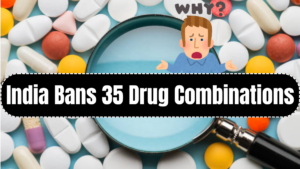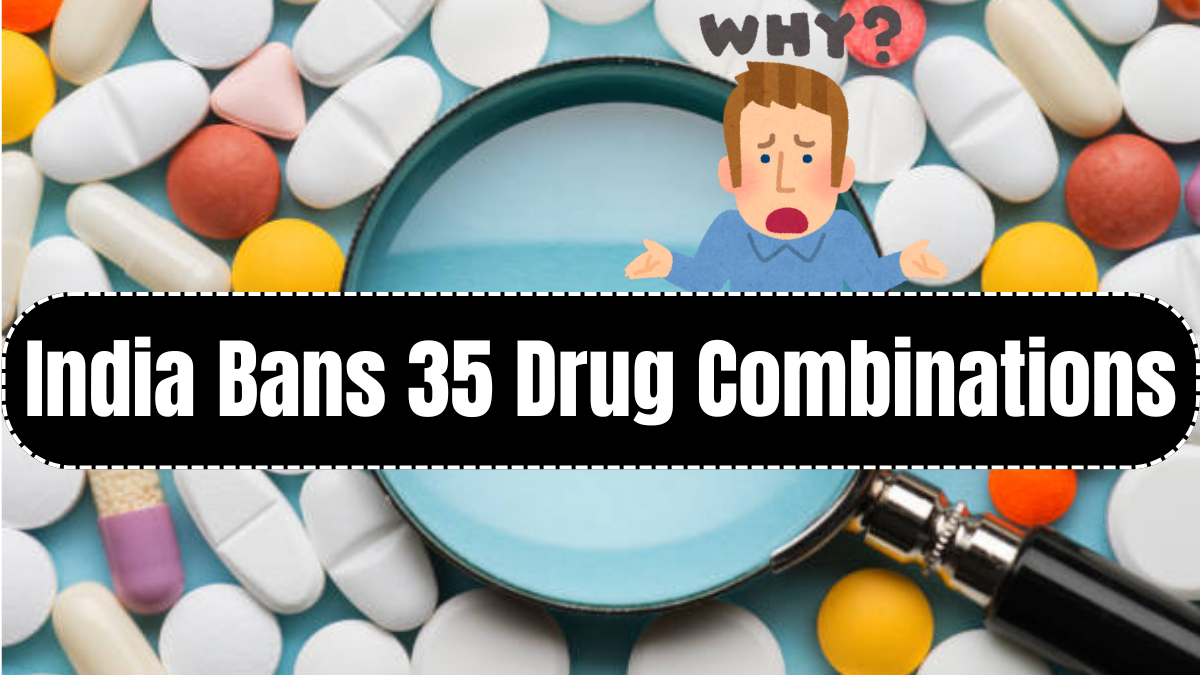In a significant move to enhance public health and safety, the Central Drugs Standard Control Organisation (CDSCO) has announced an immediate ban on 35 fixed-dose combination (FDC) drugs across India. These include medications used to treat common conditions like diabetes, high blood pressure, pain, inflammation, and respiratory ailments.
The announcement, dated April 11, 2025, has sent shockwaves through the medical and pharmaceutical communities, as several of these combinations were widely available and prescribed.

Why Were These Drug Combinations Banned?
The CDSCO flagged these combinations because they were approved by state-level drug regulators without mandatory clearance from central authorities, as required under the New Drugs and Clinical Trials (NDCT) Rules, 2019. This bypassing of safety protocols was termed a “serious public health risk” by the Drugs Controller General of India (DCGI).
The ban aims to ensure uniform enforcement of national safety guidelines, avoiding inconsistencies between state and central standards.
What Are Fixed-Dose Combination (FDC) Drugs?
FDCs are pharmaceutical formulations that contain two or more active ingredients in a single pill or dose. While they can improve treatment adherence and convenience, they also pose serious risks when not clinically validated—especially when strong drugs are mixed without proper trials.
This is why the CDSCO insists on thorough evaluations before approving any FDCs for public use.
Full List of the 35 Banned FDCs in India
Here’s the complete list of drug combinations that are no longer allowed to be manufactured, sold, or distributed in India as of April 2025:
-
Dapagliflozin + Glimepiride + Metformin
-
Cilnidipine + Metoprolol Succinate
-
Etodolac + Paracetamol + Chlorzoxazone
-
Trypsin-Chymotrypsin + Diclofenac + Paracetamol
-
Glucosamine + Diacerein + Methyl Sulfonyl Methane
-
Nimesulide + Serratiopeptidase + Paracetamol
-
Diacerein + Glucosamine + Methyl Sulfonyl Methane
-
Levocetirizine + Montelukast + Ambroxol
-
Nimesulide + Paracetamol + Serratiopeptidase
-
Paracetamol + Chlorzoxazone + Aceclofenac
-
Ofloxacin + Ornidazole + Racecadotril
-
Cefixime + Ofloxacin + Lactobacillus
-
Diacerein + Glucosamine + Boswellia Serrata
-
Etodolac + Paracetamol + Serratiopeptidase
-
Pantoprazole + Domperidone + Levosulpiride
-
Glucosamine + Methyl Sulfonyl Methane + Boswellia Serrata
-
Diacerein + Methyl Sulfonyl Methane + Boswellia Serrata
-
Trypsin-Chymotrypsin + Diclofenac + Serratiopeptidase
-
Glimepiride + Metformin + Voglibose
-
Trypsin-Chymotrypsin + Diclofenac + Methyl Sulfonyl Methane
-
Paracetamol + Aceclofenac + Chlorzoxazone
-
Paracetamol + Diclofenac + Chlorzoxazone
-
Etodolac + Paracetamol + Methyl Sulfonyl Methane
-
Cefixime + Lactobacillus + Ofloxacin
-
Paracetamol + Chlorzoxazone + Nimesulide
-
Drotaverine + Mefenamic Acid + Paracetamol
-
Glucosamine + Diacerein + Boswellia Serrata
-
Serratiopeptidase + Diclofenac + Paracetamol
-
Diclofenac + Methyl Sulfonyl Methane + Paracetamol
-
Glucosamine + Methyl Sulfonyl Methane + Diacerein
-
Paracetamol + Diclofenac + Serratiopeptidase
-
Pantoprazole + Domperidone + Simethicone
-
Trypsin-Chymotrypsin + Diclofenac + Boswellia Serrata
-
Nimesulide + Paracetamol + Methyl Sulfonyl Methane
-
Pantoprazole + Domperidone + Simethicone + Activated Dimethicone
What Should You Do If You’re Using These?
Patients currently on any of these combinations are strongly advised to discontinue use immediately and consult their doctor for safer alternatives. Pharmacies have also been directed to remove these medications from their shelves.
The public is encouraged to report any adverse effects from these drugs through India’s pharmacovigilance program or by consulting a healthcare provider.
What Happens Next?
As part of enforcement:
-
State regulators must cancel all licenses for the listed FDCs
-
Ports and drug enforcement authorities will monitor imports and movement of these medicines
-
A nationwide review of drug approval processes is likely in the near future
This action signals a broader push toward stricter drug regulation and improved transparency in India’s pharmaceutical industry.
FAQs
Why were these 35 FDC drugs banned in India?
These combinations were approved without safety and efficacy evaluations as mandated by central drug regulations, making them potentially harmful for public use.
Are these medications unsafe for everyone?
They were not subjected to mandatory clinical testing under Indian law. Although not every combination is inherently dangerous, the lack of testing makes their use risky.
What should I do if I was prescribed one of these?
Stop taking the medication and consult your doctor immediately for an alternative prescription.
Can I still buy these combinations online or from local stores?
No. As per the April 11, 2025 directive, the manufacturing, sale, and distribution of these combinations is now illegal.
How will this ban be enforced?
State-level drug controllers have been instructed to revoke licenses, and national drug enforcement teams will monitor compliance at retail, wholesale, and import levels.
Click here to know more.
Aanchal is a passionate writer with a keen interest in storytelling, content creation, and creative expression. She enjoys exploring diverse topics and crafting engaging narratives that captivate readers.

